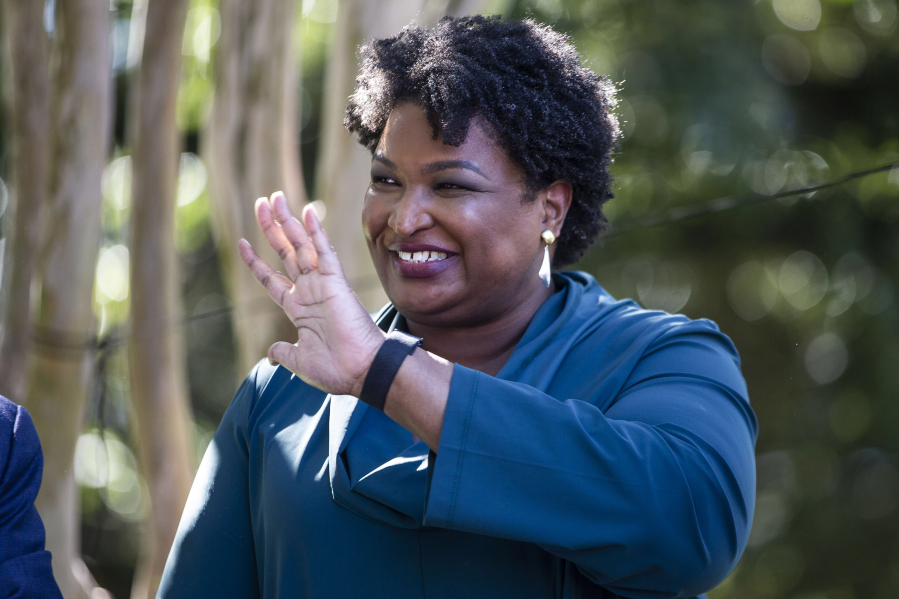ATLANTA — The state ethics commission on Monday will consider whether a nonprofit raised and spent millions of undisclosed dollars supporting Stacey Abrams’ 2018 gubernatorial campaign.
The case is the biggest so far filed by the commission’s staff in what Abrams supporters have called a long-running “fishing expedition” engineered by a supporter of her 2022 rematch opponent, Gov. Brian Kemp.
The ethics hearing comes a little more than three months before Kemp and Abrams square off again — as they did in 2018 — in the general election.
In an updated complaint against the New Georgia Project, a voter registration group that Abrams founded, and an affiliated organization, the New Georgia Project Action Fund, commission staff say the groups raised $4 million and spent $3 million before the 2018 election and should have registered as a political committee and publicly disclosed the contributions and expenditures.
The commission staff says the groups hired canvassers, passed out literature, promoted Abrams’ candidacy and solicited contributions. If the commission finds the groups illegally failed to disclosure the contributions and expenditures, it could lead to the largest ethics fine in state history, based on the amounts involved.
But New Georgia Project lawyers have filed a response saying the nonprofits’ donations were not earmarked for political activity and were used for operating expenses for the groups. The canvassing, they said, was done as a subcontractor for a pro-Abrams political committee and not subject to disclosure by the New Georgia Project Action Fund.
Those expenditures were disclosed by the political committee that hired the New Georgia Project Action Fund, they added.
As nonprofits, the lawyers said, the primary purpose of the New Georgia Project and the New Georgia Project Action Fund is not influencing election outcomes and the groups are not required to file state paperwork to report contributions and expenditures, as a political action committee or independent committee is legally bound to do.
The groups’ lawyers also said most of the allegations were time-barred — the commission had taken too long to hear the case and the statute of limitations had run out on the allegations.
If so, that is partly due to a lengthy court battle between the commission and the groups over subpoenaed bank records.
“This was always a political fishing expedition,” Lauren Groh-Wargo, Abrams’ campaign manager, said in describing the long-running case last year.
The investigation began in 2019 after the commission hired David Emadi, an aggressive Douglas County prosecutor, to become the commission’s executive secretary. The Atlanta Journal-Constitution reported at the time that Emadi had been a Kemp donor. He quickly began issuing subpoenas seeking bank records and other documents from Abrams’ campaign and affiliated groups.
While Emadi was accused of partisanship, many of the questions he raised came out of campaign report audits that commission staffers did well before he took office. Staffers had accused the previous executive director of sitting on the findings.
The commission under Emadi quickly began looking into whether Abrams’ campaign illegally coordinated its efforts with nonprofits supporting her bid for governor. Georgia law prohibits independent groups from coordinating with candidates.
Abrams’ camp says it has provided thousands of documents to the commission and that the panel was seeking records that either didn’t exist or should have no bearing on its case.
One of the groups involved in the investigation, Gente4Abrams (People for Abrams), was fined $50,000 by the state ethics commission in 2020 for failing to report what it spent to help her win the Democratic primary in 2018.
Gente4Abrams (People for Abrams) spent $240,000 for canvassing, social media posts, and print and radio advertising to help Abrams win the primary but didn’t report what it spent or where it got the money to pay for those efforts, the commission said.
The group later registered with the state and reported spending about $685,000 more to help the Democrat in her unsuccessful general election campaign against Kemp.
Since its inception in the early 1990s, politicians have griped about complaints being filed with the ethics commission — which regulates campaign finance laws — for partisan purposes. Many of the purely partisan election-year complaints wind up being dismissed by the commission or result in minor penalties, but they often get headlines.
Members of the panel, and sometimes staff, are used to being criticized as partisans.
Kemp appointed a longtime donor to the commission in April. However, until recently, the commission also had a member who donated to Abrams’ campaigns.
Under state law, the governor appoints three members — only two of whom can be from his party — and Senate leaders and the House speaker get the other two appointments.
So in a state such as Georgia, where the governor and General Assembly leaders are all Republicans, one party is always going to dominate the appointments to the panel. The same was true in the 1990s and early 2000s, when Democrats ran the Statehouse.
At Monday’s hearing, the commission will decide whether there is probable cause to believe that the nonprofits violated campaign finance laws, the initial step in the process. If, following another hearing, the groups are found to have violated the law, the commission could impose a fine and require them to file as political entities and disclose what they raised and spent.



